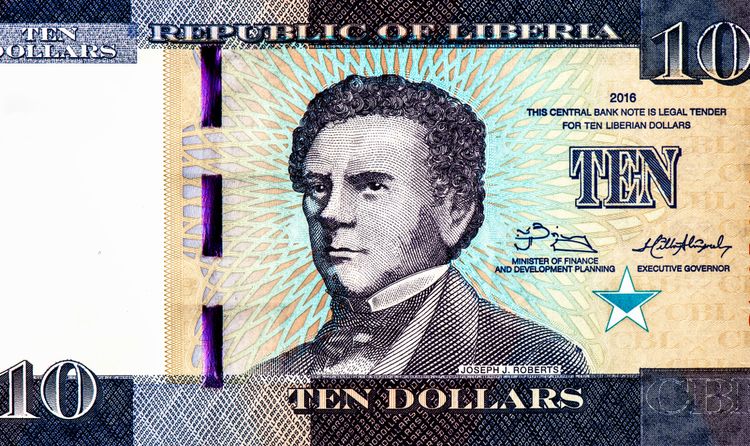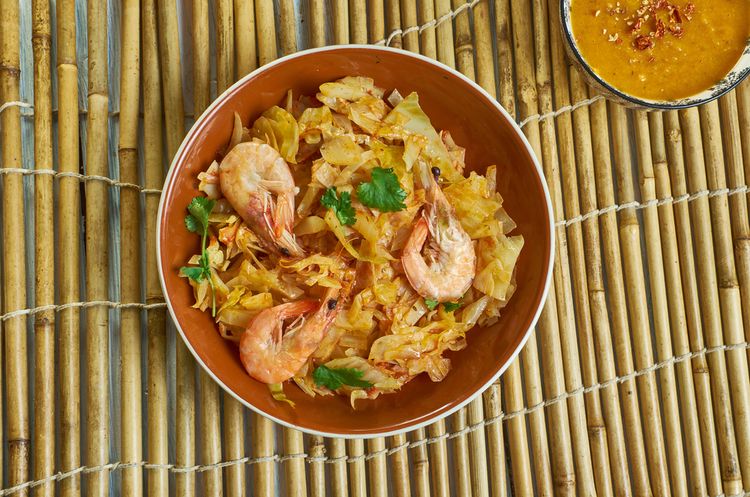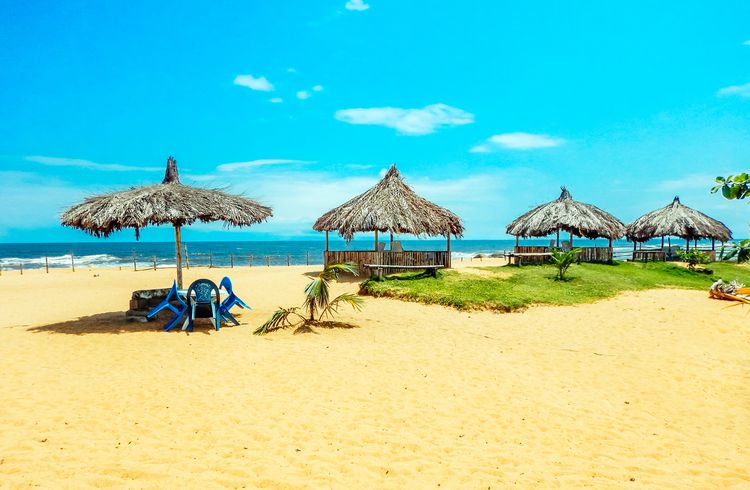Liberia Travel Tips and Information
Official Name
Republic of Liberia
Capital
Monrovia
Population
Country Code
Approximately 5.6 million
LR
Country Code (international calls)
+231
The flight time to Liberia is approximately ---- hours. Check the climate, currency, religion, manners, other information of Liberia below. Wishing you pleasant travels to Liberia.
Liberia is located in the southwestern part of West Africa, bordered by the Atlantic Ocean to the south. It shares borders with Côte d'Ivoire to the east, Sierra Leone to the west, and Guinea to the north. The inland area is covered by tropical rainforests, while the lowlands are covered with forests and savannas interspersed with wetlands.
Local Climate / Weather
Liberia’s climate is tropical, with high humidity and temperatures typically ranging between 24°C and 30°C year-round. The country experiences two main seasons: a rainy season from May to October and a dry season from November to April. During the rainy season, Liberia receives heavy downpours, especially along the coast, which can make travel more challenging due to muddy and less accessible roads. On the other hand, the dry season is marked by warm temperatures, clear skies, and the presence of the Harmattan winds, which bring dry, dusty air from the Sahara, particularly in December and January. The dry season is generally considered the best time to visit Liberia, as the weather is more predictable, and outdoor activities are easier to enjoy. For those planning to travel during specific months, it’s worth aligning with Liberia’s cultural events and festivals, which offer a unique glimpse into the nation’s heritage. In July, Liberia celebrates its Independence Day with festivities, parades, and community gatherings that reflect its rich cultural pride. Another significant time is during Liberia’s Thanksgiving in November, a holiday marked by both religious and cultural celebrations. Throughout the year, local villages and communities also hold smaller festivals and traditional ceremonies that honor various aspects of Liberian culture and history. These events can be a rewarding experience for travelers seeking an authentic cultural immersion, but planning accommodations and transportation in advance is recommended, as these festivals can attract large crowds and create higher demand for local services.
Currency & Tipping
Currency
Liberia uses the Liberian dollar (LRD) as its official currency, although U.S. dollars are also widely accepted, especially in urban areas. Liberian banknotes come in denominations of 5, 10, 20, 50, and 100 LRD, while coins, though less commonly used, are available in smaller denominations. Most businesses, particularly in the capital Monrovia, accept both Liberian and U.S. dollars interchangeably, which can be convenient for travelers. It’s best to bring U.S. dollars, as they are easier to exchange and accepted widely. Currency exchanges are available at banks and authorized exchange facilities, but travelers should be cautious of informal street vendors to avoid scams or counterfeit money. It’s advisable to check the latest exchange rates and, when possible, use banks for safer transactions.
Tipping
Tipping is appreciated but not mandatory in Liberia. In restaurants, a tip of around 10% is generally welcomed for good service, though it’s not always expected. Tipping hotel staff, taxi drivers, and tour guides is also common and typically follows a similar percentage, though travelers are free to tip according to their satisfaction with the service.
Useful Travel Information

Voltage & Electrical Outlets
The standard voltage is 120V, and the power outlets are Type A and Type B, similar to those in the United States. Travelers may need a power plug adapter if their devices don’t match these outlet types. It’s also a good idea to bring a voltage converter for any electronics not compatible with the 120V standard to prevent damage.

Internet Connectivity
Liberia’s internet environment varies, with reliable Wi-Fi available primarily in major cities like Monrovia and at some hotels, restaurants, and cafes. However, speeds can be inconsistent, and connectivity may be limited in rural areas. For those needing constant access, purchasing a local SIM card with a data plan from providers like Lonestar Cell MTN or Orange Liberia can provide more reliable coverage throughout the country.
Water for Consumption (Drinking Water)
It’s advised to stick to bottled or filtered water, as tap water is not always safe for consumption. Travelers should avoid ice cubes in drinks and opt for bottled beverages to reduce the risk of waterborne illnesses. Bottled water is widely available in urban areas, so it’s easy to stay hydrated safely during your visit.
Culture, Religion & Social Etiquette
Culture
Liberia’s culture and traditions are deeply rooted in a mix of indigenous customs and influences from its Americo-Liberian history. With over 16 ethnic groups, the country boasts a rich tapestry of languages, music, dance, and crafts. Festivals, music, and storytelling play a vital role in community life, and traditional attire, drumming, and dance performances are often seen during celebrations, providing travelers a glimpse into Liberia’s vibrant cultural heritage.
Religion
Religion in Liberia is predominantly Christian, with about 85% of the population identifying as Christian, while around 12% practice Islam, and a small percentage follow indigenous beliefs. Churches and mosques coexist peacefully, and the country values religious tolerance. Travelers will find that Liberians are generally welcoming and respectful of different religious beliefs, and visiting a church service or cultural ceremony can offer an enriching experience.
Social Etiquette
Liberians are known for their politeness and hospitality. A friendly greeting or handshake is customary, and it’s polite to greet elders first. Respect for personal space is also valued, and taking time for small talk before discussing business is appreciated. When visiting someone’s home, it’s polite to accept any refreshments offered, as declining can be seen as impolite. Showing respect for local customs and traditions is essential, and Liberians will warmly welcome those who are open to learning about their ways.
Food Culture
Liberia’s food culture is a flavorful fusion of African and Caribbean influences, featuring hearty dishes that highlight ingredients like rice, cassava, plantains, and fresh seafood. Liberian cuisine often uses bold spices and seasonings, with popular dishes like jollof rice, palm butter stew, and cassava leaf stew, which are enjoyed by locals and visitors alike. For those eager to experience authentic Liberian flavors, street food stalls are perfect for sampling favorites like fried plantains, grilled fish, and “pepper soup,” a spicy, aromatic soup enjoyed across the country. In Monrovia, restaurants such as The Bodega and Evelyn’s offer delicious local dishes alongside international options, providing a comfortable and flavorful dining experience for travelers.
Major Tourist Attractions & UNESCO World Heritage Sites
Major Tourist Attractions
Liberia offers a range of captivating tourist destinations for adventurous travelers seeking natural beauty and cultural experiences. One of the top destinations is Sapo National Park, Liberia’s largest protected rainforest, home to a remarkable array of wildlife like pygmy hippos, chimpanzees, and over 600 bird species. Here, guided tours provide a unique chance to explore untouched rainforests and experience Liberia’s incredible biodiversity up close. For those who enjoy sun and sand, Robertsport’s beaches are a must-visit, known for their scenic beauty and excellent surf. Travelers can relax on golden sands, catch waves, or explore nearby fishing villages to get a taste of Liberia’s coastal life.
UNESCO World Heritage Sites
Liberia is also home to world heritage sites that reflect its rich history and cultural significance. The Providence Island site, near Monrovia, is a UNESCO tentative site where freed American slaves first arrived in Liberia in the early 19th century. Visitors can take guided tours of the island to learn about its historical significance and Liberia’s journey toward independence. The heritage site includes remnants of early colonial structures and offers fascinating insights into Liberia’s founding. Additionally, the historic city of Harper, with its distinctive colonial architecture and links to Liberia’s early development, is a culturally rich destination where travelers can explore Liberia’s heritage through well-preserved buildings and landmarks.
Travel FAQs
What is the safety situation in Liberia like? What should travelers be careful of?
Liberia has a Level 2 travel advisory, indicating that travelers should exercise increased caution due to crime and civil unrest. Violent crimes, such as armed robbery, are common, particularly in urban areas and on public beaches.
What is the most popular airport to fly into Liberia?
Monrovia Roberts International Airport.
How much should I tip at restaurants in Liberia?
Tipping is not a custom in Liberia, but it seems that people do give money as a token of their appreciation.
Do I need vaccinations to enter Liberia?
In Liberia, you will need a yellow fever vaccination certificate called a yellow card and a recommendation letter in English, so be sure to check in advance.




